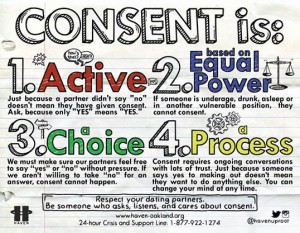Sexual violence violates a person’s trust, autonomy, and safety. At the Wichita Area Sexual Assault Center, we recognize that sexualized violence occurs anytime someone is forced, manipulated, and/or coerced into any unwanted sexual l acts imposed on a person without their consent. The range of sexual violence includes rape, child sexual abuse, incest, date and acquaintance rape, statutory rape, marital or partner rape, commercial sexual exploitation, human trafficking, voyeurism, receiving unwanted images or solicitation online, and sexual harassment.
Sexual violence is a crime motivated by the perpetrator’s wish to humiliate, control, and harm. These crimes are never the victim’s fault. Victims do not provoke rape or any form of sexual violence.
Early awareness campaigns carried slogans like, “No means no.” But the spectrum of sexual violence is much bigger than that. No does mean no. And yet, oftentimes victims are unable to say no. Silence does not equal consent. Many survivors of sexual violence are not sure what to call their experience. Because of the culture we live in, we were taught that rape usually meant a scary dark alley and a stranger. While that may happen, the majority of sexual assaults look very different.
Most victims know, love or trust their perpetrator.
Most perpetrators appear to be “nice” people. They are often well-respected by other people. This does not mean they are not capable of perpetrating sexual assault. Many perpetrators use “niceness” as a tool to gain their victim’s trust.
Whenever we talk about threatening situations, we often hear the words fight or flight. We forget to mention freeze. Freezing is an extremely common reaction to sexual assault. Many victims describe “feeling paralyzed” or experience “an inability to speak.” If you had this experience, please know you are not alone. And please know that freezing does not mean you consented.
There are a million right ways to survive sexual violence. There is no one way to do things or one right way to react. If you have questions about an experience you have had, you can talk to a trained sexual assault victim’s advocate anytime by calling our crisis line. (316) 263-3002.
What is consent?
Consent is a “Yes! I want to do this!” Consent happens with communication. Consent is clear. Consent is an agreement to do something. When sex is consensual, it means everyone involved has agreed to what they are doing. If sex is not consensual, it is sexual violence.


